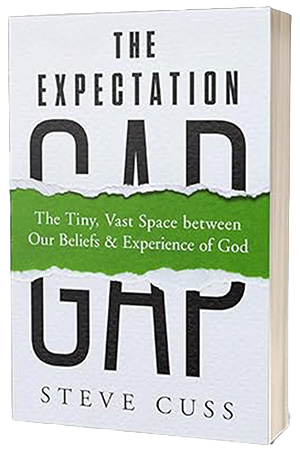
Is the Gospel Redemptive or Preventative?
When you think about the gospel, do you think it is primarily redemptive or preventative in nature? Does the gospel primarily rescue us from trouble, or does it primarily stop us from getting into trouble?
Redemption v. Prevention
A redemptive gospel says, “No matter what we’ve done and what has been done to us, we can always come home.” Forgiveness, restoration, repentance, second chance, a new creation. A redemptive gospel focuses on God’s unconditional and specific love for each human being. God makes the first move, always toward us. This gospel focuses primarily on God’s love for us.
A preventative gospel says, “Live within these guidelines to honor God and express your love for God. As a side benefit, you will avoid a world of pain and heartache.” Its goal is a life relatively free of regret and relational damage, a life based on a series of habits and decisions oriented around God’s ways—faithfulness, obedience, worship, wisdom in choosing friendships, generosity, let our yes be yes and our no be no, build our houses on the rock so we withstand the storm. The preventative gospel focuses on us moving toward God and our love for God.
There is no question that the gospel of Jesus is both redemptive and preventative, but which do you think is primary? In the game of “Would You Rather?” we are forced to choose between two difficult options. If you were forced to choose only one dynamic of the gospel, which would you choose?
I think most of us would choose the gospel of redemption as primary. To be sure, Jesus taught both dynamics, but his life arc, his teachings, and his death and resurrection bend strongly toward the redemptive as the foundational reality of the gospel.
Day-to-Day Life
The problem is, most of us live day-to-day as if the gospel is primarily preventative. That makes sense to me. When I think of God’s redemption, my default posture is to think of it in the past tense—God redeemed me, and now I live in response to that reality by orienting my life around God’s commands. I do not do this to curry favor with God or to earn anything. I do it to please God and because I believe God’s ways are the best ways for a human to thrive with unfettered freedom. I have come to believe that all God’s commands are designed for human flourishing and to access true peace. Who wants to blow their life up with secret habits? Who wants to cause relational damage to the people they love? It is better, and frankly easier, to live in God’s ways and avoid all of that. We love because God first loved us (see 1 John 4:19). That is true, and it works.
Harmful Consequences
But when we live primarily in view of God’s preventative gospel, we create harmful consequences, especially if we have been Christians for a while. As a pastor, I have worked with many parents who want their children to love God in the same way they love God, but their language and posture are preventative, not redemptive. When parents ask for my help, they rarely say, “We really want our children to experience God’s love for them.” Instead they say, “We want our kids to love God,” except for when they have never experienced God’s love first and primarily.
If we try to love God before we experience God’s love, we are in danger of practicing legalism, getting on the more-of-the-same and try-harder treadmills, and that can be soul-sucking. Other religions teach us to love God, but the Christian gospel teaches that “God loves us.” It is first and foundational. We love God because God first loved us. After a while, we keep that love in the rearview mirror, and by doing so, we unintentionally communicate to those around us, including our children, that the preventative gospel is primary.
God’s Love First
Before God’s kingdom ever issued a rule, it issued an invitation. That invitation is ongoing, never-ending, and always available. God’s mercies are new every morning; great is God’s faithfulness (see Lamentations 3:23). God’s love first. God’s love always. God’s faithfulness as primary. Our love for God pours out in response to God’s love for us. God’s love is scandalous to humans. Rich Mullins calls it a “reckless” love in his song “The Love of God.”
Humans will always default to a posture in which we are at the center of everything, and it can cause us to cast ourselves as the primary actor in our own life. But the gospel of Jesus is that God acts first, and we react, not once but always. God makes the first move, and we respond. Unfortunately, over time, we tend to think our faith originates from us. These dynamics are why we quickly make our way to the preventative side.
Prevention or redemption? How might your language and posture change as you raise kids or disciple others? How might it benefit your own faith to intentionally think redemptive first and always?
Adapted from The Expectation Gap by Steve Cuss.

The Expectation Gap
Get tangible tools for engaging with God in a deeper, more soul-satisfying way. The Expectation Gap helps you unveil harmful expectations and patterns that keep you spiritually stuck so that you can replace them with habits and practices that will lead to a more vibrant faith life.
Learn More







Thank you Steve for your commitment to Our Lord and in helping our family and communities.
Thank you Jesus for your help and love, Amen
Thank you
Very strong and good word.
Thank you for your simply and beautifully explained article. Our group bible study, meeting today, is studying Exodus. This is perfect explanation of how we see our devotion and love to our God. I will be bringing your article to our discussion tonight. God bless you.
God is good all the time.
I never thought about it this way. I think both issues are important but after raising four kids, maybe I should’ve shared more about how much God loves them instead of trying to prevent them from not going to heaven.
Exactly. The good Lord give you the grace to carry it out.
Thanks for your awesome message from God.
So, if we think ” redemptive” first, then “preventive” will (mostly, we are still human) follow.
Thank you Steve for your commitment to Our Lord and in helping our family and communities.
Thank you very much.
Thank you so much for your message! May God bless you abundantly!
Very deep and refreshing word of God. Redemptive and preventative gospel is eye-opening to know that God can get us out of trouble in the same way that operating within the confines of God’s principles keeps us from getting into trouble. Thank you.
Thank you for your enlightening word.
Thanks! Your article should help to clear up the misunderstandings about dos and donts with which a number of Christians struggle.
Thanks for the message. It’s a great help to me.
Thank you very much. This article helps me a lot.
Great stuff.
The message is about renewal and regeneration, to be rooted in Christ.
I was raised Catholic but never taught to read the Bible. Went on a journey in my teenage years out of God’s will. I have since been saved but have found my Christian life wanting and lonely. How do I go about changing that? I’ve been to Bible studies with my local church and still feel like an outsider. I am 58 years old and feel alone. How can I get closer to God?
Thanks for sharing your struggle William. Spiritual loneliness is difficult, but please know that God is near and has not abandoned you. Consider finding a spiritual mentor and/or speak with your pastor. Here is an article you might find helpful: https://www.thenivbible.com/blog/feeling-the-presence-of-god-in-your-life/
Please send me these articles so I can better understand the Bible.
Sign up here and receive articles weekly: https://www.thenivbible.com/niv-blog-signup-form/
Thank you God for loving me.